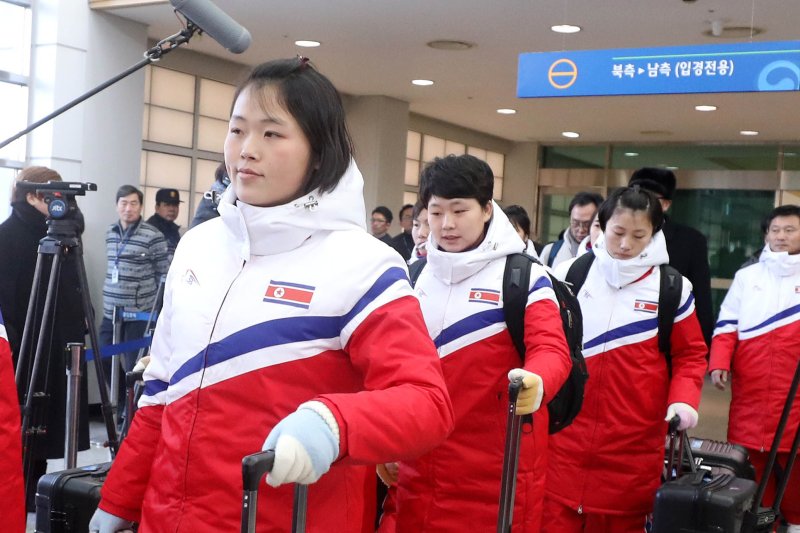Recent inter-Korea exchanges are being monitored by the Trump administration, but it is unclear how detente will serve the aim of North Korea denuclearization, a U.S. analyst said Friday. Photo by Yonhap
NEW YORK, Jan. 26 (UPI) -- North Korea's push for reconciliation with the South is being welcomed in the United States.
But in the absence of a nuclear shift, U.S. President Donald Trump's administration is not ruling out the possibility of a limited military strike, a former CIA analyst said Friday.
"They're not kidding about this, this is a policy option that is being considered," said Sue Mi Terry, a senior fellow at the Center for Strategic and International Studies, during a talk delivered at The Korea Society. "All options are truly on the table right now."
Terry was referring to a recent Wall Street Journal article that provided details regarding a debate in the Trump administration about whether a "bloody nose" surgical strike could be a viable option that could damage North Korea's weapons capabilities and increase pressure on Kim Jong Un.
But such a move could never receive approval in South Korea.
"I don't think Seoul and Washington at all are going to be at the same place when it comes to the military option," Terry said. "[South Korean] Foreign Minister Kang Kyung-hwa said today that it's absolutely unthinkable, Washington cannot go forth with a military option without Seoul's consent."
The analyst added if Washington tries to "go with the kinetic option" it might never reach the full support of allies or partners.
"Unless North Korea's provocation is so great they are almost giving us justification."
Terry said the military option is being raised as a possibility in the U.S. government because supporters of the idea believe Kim Jong un will respond with restraint.
"Some folks who actually think of a limited military strike [say] Kim Jong un might not retaliate, or retaliate in a very limited way, then take us back to the negotiation table," she said.
"There are actually people who make this argument, [who are] using Kim Jong Un's rationality as a reason, [that] he's not going to go for all-out conflict that will spell the end of the regime."
Meanwhile, North Korea stands to gain a great deal from the reconciliation on the peninsula, driven by inter-Korea cooperation ahead of the 2018 Pyeongchang Winter Olympics.
"What does Kim Jong Un have to lose? There are absolutely no financial or political costs," Terry said. "They get to have a complete image makeover on the world stage, with 230 vetted cheerleaders."
The process of reconciliation also has been a coup for South Korean President Moon Jae-in's administration, but for different reasons.
Exchanges between North and South have reassured South Korea their neighbor has ruled out the possibility of ruining the Winter Games with ballistic missile launches, a concern that did exist before detente.
The South Korean leader may be envisioning ways to extend the temporary peace.
"Moon [and his administration] do want to make sure this inter-Korea thaw and engagement goes beyond just inter-Korea, to make progress on the nuclear and missile program, progress in U.S.-North Korea relations" after the Olympics, Terry said.
"There is a small window of opportunity right now, because there is a suspension of joint military exercises that will at least take us to the end of March."
But given North Korea's lack of willingness to denuclearize, Moon may have to limit his ambitions.
"I do think we have to be very clear-eyed about this, and I do think we should temper our expectations that this is somehow going to drastically improve the nuclear and missile crisis."
North Korea may make demands that could not be met in Seoul, for example, and South Korea is unlikely to provide sanctions relief or reopen the Kaesong Industrial Complex, Terry said.
Kaesong is the jointly operated factory park that shuttered in 2016.
"They will have to give something to North Korea, and what would that be? It would be joint military exercises, some give would have to be there," Terry said.
Joint U.S.-South Korea drills were postponed for the Olympics, which has led to speculation North Korea seeks to decouple the alliance.
The reconciliation has been followed by a new North Korea approach, including propaganda statements about missiles being meant for the United States, but not South Korea, and ethnic solidarity.
But the calls for unification have, ironically, been met with greater discord in the South.
South Koreans have voiced their opposition to the president's strategy, creating a South-South wedge that was not there before North Korea offered to send its Olympians.
All of which may tie in with North Korea's long-run strategy.
"Perfecting nuclear weapons, it goes beyond regime survival, which is the most important priority," Terry said.
"But somehow it goes beyond that."















